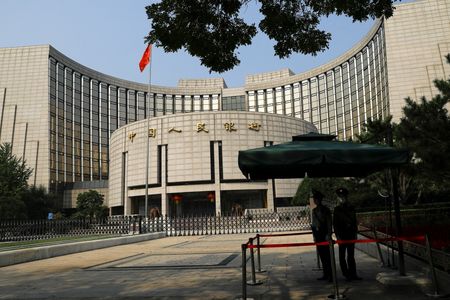SHANGHAI (Reuters) – Warnings by China’s central bank about excess exposure to long-dated sovereign bonds are aimed at curbing potential systemic risks if yields continue to fall, a senior official at a financial market association said.
Beijing has stepped up intervention in its bond markets – the world’s second largest – in recent weeks, warning of the risks of reckless buying, and the moves appear to have halted a long, frenzied bond rally. Bond prices move inversely to yields.
The warnings from the People’s Bank of China (PBOC) are aimed at “curbing potential systemic risks that may be hidden by a unilateral downward trend in these rates due to herd behavior,” Xu Zhong, deputy secretary-general of National Association of Financial Market Institutional Investors (NAFMII), said in an interview with PBOC-backed Financial News.
Still, the PBOC has not set a range for bond yields, Xu said, adding China’s approach differed from some economies which have implemented unconventional monetary policies to control government bond yield curves.
China’s long-dated sovereign bonds have surged this year as investors seek safety from a slowing economy and volatile stock markets, triggering repeated warnings from the PBOC.
Xu’s comments come as traders search for direction after trading volume dropped significantly over the past week as regulators increased scrutiny over brokers and banks’ bond dealings.
Chinese treasury yields broadly fell after Xu’s comments, with the 10-year yield down roughly 2 basis points as of 0954 GMT.
Xu also said some financial institutions’ suspension of treasury bond trading in a “one-size-fits-all” approach misinterpreted the central bank’s intentions, going from one extreme to another.
China’s securities regulator has ordered some brokerages to inspect their bond trading activities, and some brokerages have voluntarily refrained from trading longer-dated bonds, according to traders.
Some small lenders are not as sensitive to interest rate risks and are trading aggressively using households’ deposits, said Xu, adding that such strategies are apparently beyond their risk management capability.
In early August, China probed four regional lenders over suspected market manipulation.
(Reporting by Shanghai Newsroom; Editing by Kim Coghill)





